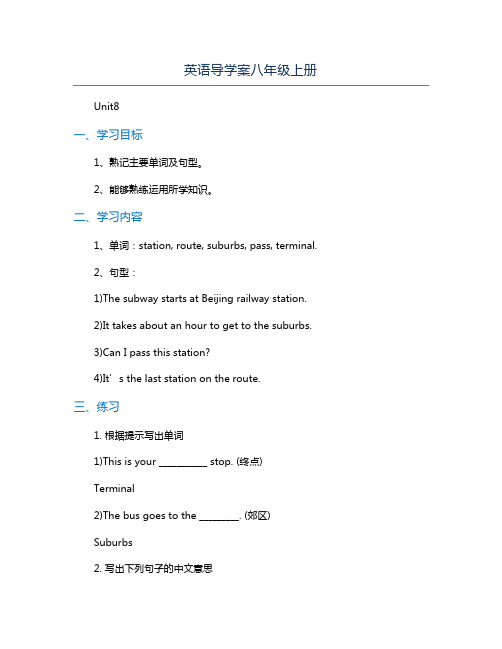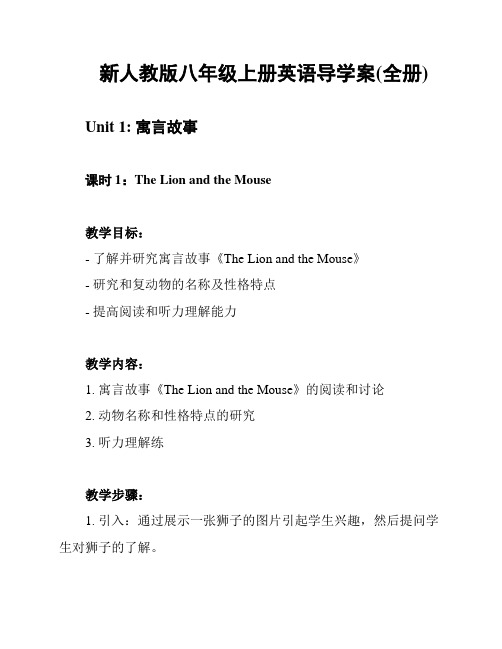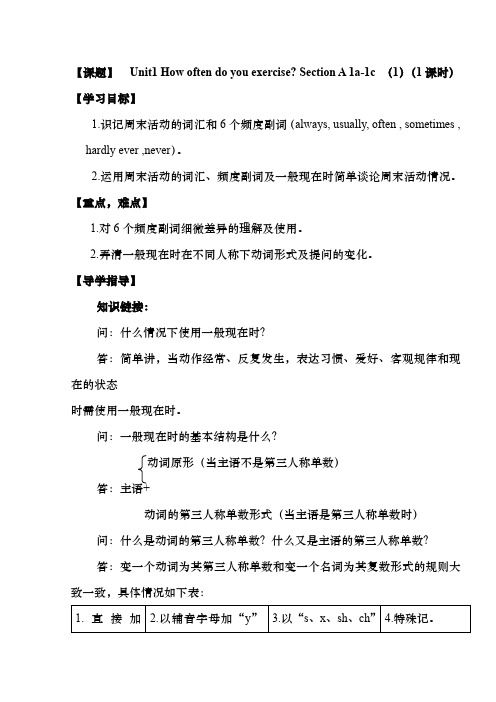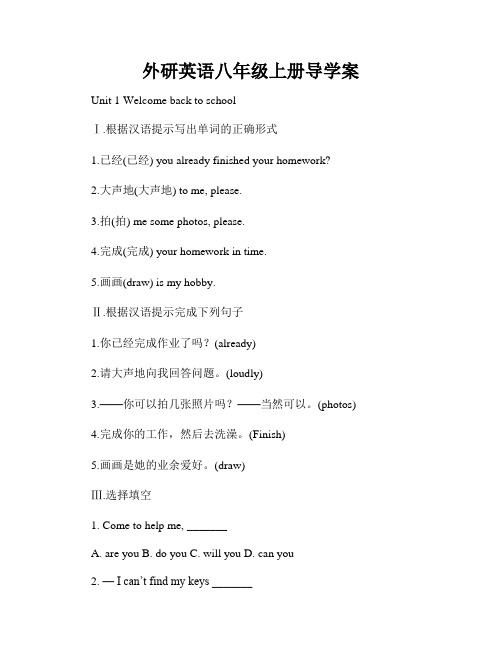八年级英语导学案1
人教版八年级英语下册《Unit 1 What’s the matter》导学案1

本文由一线教师精心整理/word 可编辑1 / 1《Unit 1 What ’s the matter 》导学案1课题 Unit 1 What ’s the matter? Section A导学目标: 1. 疾病与事故伤害的询问与应答:What ’s the matter with …? I have a cold. 2. 情态动词 should 询问及陈述建议 3. 健康与急救常识 4.关爱他人重点:健康问题及提出相关建议的语言结构 难点:词汇量多导学过程 导学过程1. 询问某人患了何种疾病或遇到什么麻烦“怎么了?” What ’s the matter? What ’s the matter with you? 还可以有如下替换:What ’s your trouble? What ’s the trouble with you? What ’s your problem? What ’s the problem with you? What ’s up? What ’s wrong with you?2. 疾病,伤害及救治的表达(1)用 “have/get a(n) +疾病名称” 表示患病:have a cold, have a fever, have a cough, get astomachache, get a toothache, catch a cold(2)用 “be/feel + 形容词”表示不适:be/feel tired, be/feel sick, head feels hot(3)用“get ”表示受伤: get hurt , get cut in the hand, get hit by a ball(4)用“hurt /cut/break+具体部位”表示伤害:hurt my leg, cut her finger, break his arm(5)用“hurt /cut 等+反身代词”表示伤着自己:hurt myself , cut himself(6)用“take (更常见 )/get ”表达诊治:take one ’s temperature, take some medicine, take/get anX-ray(picture)(7)用see 或 go to 表达就医:go to the hospital看医生 go to a doctor go to see a doctor go to the doctor ’s see the doctor 看牙医 go to a dentist go to see a dentist go to the dentist ’s see the dentist3. should (should n’t)(1). 委婉地提出意见或建议时,“应该,应当”You should eat lots of healthy food. (你应该多吃些健康的食品) Should I help you clean the park? (我应该帮你打扫公园吗?) What should I do for them? (我应该为他们做些什么?) (2). 表示义务责任,“应该,应当”You should pay for the books. (你应当付书钱) (3). 命令或要求,语气比较强烈。
英语导学案八年级上册

英语导学案八年级上册Unit8
一、学习目标
1、熟记主要单词及句型。
2、能够熟练运用所学知识。
二、学习内容
1、单词:station, route, suburbs, pass, terminal.
2、句型:
1)The subway starts at Beijing railway station.
2)It takes about an hour to get to the suburbs.
3)Can I pass this station?
4)It’s the last station on the route.
三、练习
1. 根据提示写出单词
1)This is your ___________ stop. (终点)
Terminal
2)The bus goes to the _________. (郊区)
Suburbs
2. 写出下列句子的中文意思
1)The subway starts at Beijing railway station. 地铁是从北京火车站开始的。
2)It takes about an hour to get to the suburbs. 大约需要一个小时到达郊区。
3)Can I pass this station?
我可以通过这个站吗?
4)It’s the last station on the route.
这是这条路线上的最后一个车站。
八年级英语上册导学案-Unit 1 Where did you go on vacation

Unit 1 Where did you go on vacation? 导学案Section A 1a—2c第1课时【学习目标】:1. Talk about past events2. To learn to use where questions and answers【学习重点】:学会用一般过去时态描述曾经度过的假日。
【学习过程】:1. 知识链接:1). 复习一般过去时态的意义与结构。
2). 掌握一些规则的和不规则动词的过去式。
2. 自主学习(教师寄语:Many hands make light work. )1) 要求学生小组讨论自己刚刚过去的暑假。
并写下用到的句型:____________________________________________________________________________ ____________________________________________________________________________ _______________________________2) 利用素材练习以上句型。
3)认读短语并将单词与图画匹配.4)小组活动Example: A: Where did Tina go on vacation?B: She went to the mountains.3. 听力练习1)Listen. Where did the people go on vacation? Complete the chart.People PlacesGraceKevinJulie2)Listen again. Check(√)Yes, I did or (×)No, I didn't for each question.4. 巩固练习According to the listening, and role-play the conversations between Grace, Kevin and Julie.Example: A: Grace, where did you go on vacation?B: I went to New York City.A: Oh, really? Did you go with anyone?B: Yes, I went with my mother.课后作业Show us your vacation. Whose vacation is the best(最棒)?【学习小结】(教师寄语:No man can do two things at once.)1. 总结一下本课时学到的动词短语。
新人教版八年级上册英语导学案(全册)

新人教版八年级上册英语导学案(全册) Unit 1: 寓言故事课时1:The Lion and the Mouse教学目标:- 了解并研究寓言故事《The Lion and the Mouse》- 研究和复动物的名称及性格特点- 提高阅读和听力理解能力教学内容:1. 寓言故事《The Lion and the Mouse》的阅读和讨论2. 动物名称和性格特点的研究3. 听力理解练教学步骤:1. 引入:通过展示一张狮子的图片引起学生兴趣,然后提问学生对狮子的了解。
2. 阅读故事:带领学生阅读寓言故事《The Lion and the Mouse》并注重理解故事情节。
3. 讨论问题:让学生回答关于故事的问题,例如:What did the lion do to the mouse? Why did the lion spare the mouse?4. 研究动物名称和性格特点:教授单词lion、mouse等动物名称,并让学生描述它们的性格特点。
5. 听力理解练:播放与故事相关的听力材料,要求学生听并回答问题。
作业:1. 抄写故事《The Lion and the Mouse》的关键句子。
2. 阅读课本上关于动物名称和性格特点的内容并做笔记。
Unit 2: 基础篮球技巧课时1:Dribbling教学目标:- 研究和掌握篮球运球的基本技巧- 提高身体的协调能力和手眼协调能力- 培养团队合作意识和体育精神教学内容:1. 篮球运球技巧的演示和解释2. 练篮球运球的基本动作3. 小组合作练教学步骤:1. 引入:向学生展示篮球运球的动作,并解释其重要性和应用场景。
2. 演示和解释:仔细演示篮球运球的基本技巧并解释每个动作的要点。
3. 练动作:让学生跟随教师一起练篮球运球的基本动作。
4. 小组合作练:将学生分成小组,进行篮球运球的练。
每个小组轮流进行练,其他组员观察并给予反馈。
作业:1. 回顾并练篮球运球的基本动作。
人教版八年级英语上册导学案(全册)

always从不,决不★
often几乎不☆(no star)
2.小组交流学习成果并讨论下列按频率高低顺序排列的表达是否正确(正确写T,错误写F)?若不正确,给出正确表达。
always>often>usually>sometimes>hardly ever>never.____
______>______>_____>______>_______>____.
5.Pair Work Show(展示对话)。
【课堂练习】
一、口译“自主学习一”所列词汇。
二、用所给词的适当形式填空。
1.Do you know Zhang Yining?Her ______(one)name is Yining and she surfs the Internet ______(one) a week.
【课题】Unit1 How often do you exercise? Section A1a-1c(1)(1课时)
【学习目标】
1.识记周末活动的词汇和6个频度副词(always, usually, often , sometimes , hardly ever ,never)。
2.运用周末活动的词汇、频度副词及一般现在时简单谈论周末活动情况。
知识链接:
一、将一个句子变为否定句的三个步骤:1、在要求变为否定句的句子中寻找be动词am、is、are、was、were,若有其中某个的话,在其后边加not即可(也可将其两个词缩写:is not=isn’t;are not=aren’t;was not=wasn’t;were not=weren’t)。2、若在要求变为否定句的句子中找不到am、is、are、was、were,就在其中寻找情态动词can、may、must、should、will、would、could、shall等,若有其中某个的话,就在其后加not即可(也可根据需要将其缩写:can not=can’t,must not=mustn’t, will not=won’t)。3、若在要求变为否定句的句子也找不到情态动词,就借助助动词do、does、did,第三人称单数借助does,不是第三人称单数借助do,一般过去时借助did,并在其后加not(分别可缩写成don’t、doesn’t、didn’t)后边的动词打回原形。
外研英语八年级上册导学案

外研英语八年级上册导学案Unit 1 Welcome back to schoolⅠ.根据汉语提示写出单词的正确形式1.已经(已经) you already finished your homework?2.大声地(大声地) to me, please.3.拍(拍) me some photos, please.4.完成(完成) your homework in time.5.画画(draw) is my hobby.Ⅱ.根据汉语提示完成下列句子1.你已经完成作业了吗?(already)2.请大声地向我回答问题。
(loudly)3.——你可以拍几张照片吗?——当然可以。
(photos)4.完成你的工作,然后去洗澡。
(Finish)5.画画是她的业余爱好。
(draw)Ⅲ.选择填空1. Come to help me, _______A. are youB. do youC. will youD. can you2. —I can’t find my keys _______— When _______ you last see them?A. where, didB. that, haveC. that, didD. where, have3. Excuse me, can you help me _______ the road to the zoo?A. to findB. findsC. findD. found4. — Would you like to go to the movies with us this evening?—I’d love to, _______ I must prep are for my test tomorrow.A. orB. andC. butD. soⅣ.情景交际A: Excuse me, 1B: Certainly. Would you like to go there on foot?A: No, 2B: Well, you can take the No. 5 bus.A: How 3B: It’s about ten minutes’ ride.A: Thank you very much.1. A. can you help me find the way to the museum?2. A. I’d like to go there by bike.3. A. far is it from here to the museum?语言专项Ⅰ.选词填空A.根据句意及所给单词的首字母提示写出句中所缺单词1. Alice loves d________. She often reads the sports news in the newspaper.2. To keep health, we should have p________ exercise every day.3. The sun is s________ than the moon.4. The g________ are reading in the classroom.5. It’s very cold outside. Please close the w________.B.根据汉语提示完成下列句子6.—What’s the weather like today? — t________.7. — Why are you so tired? — I went to the party yesterday and I came back l________.8. Helen w________ to her friends on her way home yesterday.9. Do you like s________?10. We have fun s________ on the beach every Sunday.Ⅱ.句型转换1. Tom usually goes to work by bus. (变一般疑问句)— _______ Tom _______ to work by bus?2. They are at school now. (用just判断句子改写)— They _______ _______ at school.3. I will go to the bookstore after school. (对划线部分提问)— _______ _______ you _______ to go to the bookstore?4. It’s over there. (同义句)—It’s _______ your right.5. Helen played volleyball with her classmates after school yesterday. (对划线部分提问)— _______ _______ Helen play volleyball with after school yesterday?Ⅲ.连词成句1. is, book, the, who, looking, for, my2. to, wear, you, should, in, summer, sunglasses, the, sun3. back, my, and, room, turn, then, it, clean, the4. do, you, what, school, in, often, the, do5. then, practice, let’s, the, speaking, dialoguesⅣ.文化知识Language is very important in our daily life. It helps us to u and communicate with others. There are about 6,000 languages spoken in the world. English is one of the most important languages in the world. It is spoken by people all over the world. People in different countries speak English when they meet each other. Most countries use English as a secondlanguage. English is also used as a kind of working language. When people from different countries do business together, they often use English to communicate with each other. So learning English well is very important. It can help us know more about the world.。
牛津深圳版八年级英语上册《Unit 1 Encyclopaedias》导学案(1)
《Unit 1 Encyclopaedias》导学案(第1课时)【学习目标】Mastery words and expressions理解两篇摘自一本百科全书的小文章【重难点预测】重点:通过学习本章的主阅读,学会介绍人物难点:抓住信息点【自主学习】1.()v.发明()n.发明()n.发明家()n.音乐()n.音乐家( ) adj.音乐的总结:以er、or和ian结尾的单词一般表示做这项职业的人。
eg:teach v.教——teach er教师act v.表演——act or演员Italia n.意大利——Ital ian意大利人2.英汉互译(1)intelligence (2)ability(3)include (4)suddenly(5)灭绝(6)去散步3.用线将下列单词和它的中文意思连起来。
ability A.包括born F.突然human B.没有人intelligence G.发明however C.人的sudden ly H.出生nobody D.能力invention I.获胜include E.然而win J.智慧合作交流根据两篇短文的介绍在文章中找出相关的信息。
Da Vinci,Leonardo1. Year of birth2. Year of death3. Career4. Life5. Main contributionsDinosaurs1. When and where they lived2. Appearance3. Food4. Current situation理解重点词汇和句子be bornhuman beingin the countrysideas...asDa Vinci was born in the countryside.From the early age, he showed great intelligence and artistic and sc ience ability. Some dinosaurs were as small as chickens. Others were as big as ten elephants. Nobody knows why. However, we can learn about them from their fossils.五.效果反馈1.他和我一样高(as...as)2. When somebody i s born, he/she_______a. comes out of his/her mother’s bodyb. goes to see a doctorc. leaves his/her parents3. Benny’s grandparents live in th e countryside. They live ___ the city.a inside b. outside c. in the centre of4. The book includes some beautiful photos. These photos are ______ the book.a. part ofb. at the end ofc. connect ed of5. A human being i s a(n) ______.a. animalb. machinec. person6. Birds have a musical ability. They ____ sing.a. singb. cannotc. are happy to六.熟悉全文,掌握两篇短文中介绍的关键信息。
仁爱版八年级英语上册导学案(全册)
仁爱版八年级英语导学案Unit1 Playing sportsTopic1 Are you going to play basketball? Section A学习目标:1.掌握Page1—2的单词,重点短语及句型。
2.熟练掌握“be going to +动词原形”的结构表示的一般将来时。
3.积极、主动的参与课堂。
学习重难点:1.一般将来时来时概念:表示将要发生的动作或存在的状态及打算、计划或准备做某事。
基本结构:be going to + do(动词原形);.句中一般有以下时间状语:(后tomorrow, next day(week, month, year…),soon, the day after tomorrow 天)等。
否定句:在be动词(am, is, are)后加not;一般疑问句:be提到句首,some改为any, and改为or,第一二人称互换。
例如:I’m going to have a picnic this afternoon.not going to have a picnic this afternoon.→ I’mWe are going to go on an outing this weekend.→ Are you going to go on an outing this weekend?2. see sb do sth “看见某人做某事” 表示看见事件、行动的全过程,动作已经结束。
看见某人正在做某事”强调事件正在进行。
see sb doing sth “3.have a … game against … “同…进行一场…比赛”4.cheer…on “为某人加油(喝彩)”5.-- Would you like to do sth?-- Sure, I’d love to.6. Me,too.自学引导:1、自学Page1-2的单词。
(根据音标拼读、拼写单词并牢记)。
八年级上英语导学案
八年级上英语导学案Unit 1 《Welcome back to school!》Ⅰ. 单词拼写根据句子意思及首字母提示,完成下列各句中的单词拼写,使句意完整。
1. Welcome back! How was your s_____ vacation?2. The new t_____ arrived at school early to prepare for the first class.3. I f_____ my homework yesterday, so I could go to the movies.4. Don't forget to set your a_____ for 6:30 a.m. tomorrow.5. Please p_____ your homework on the teacher's desk before you leave.Ⅱ. 单项选择从每题所给的选项中,选出可以填入空白处的最佳选项。
1. —Hi, Lily. How was your summer vacation?—It was great. I went to Beijing and ____ my grandparents.A. visitsB. will visitC. visitedD. visiting2. My father likes to listen to music ____ the evening.A. inB. onC. atD. for3. The library is _____ the left of the post office.A. onB. inC. atD. with4. —Hello! Can I help you?—Yes, I'd like to buy a present _____ my sister's birthday.A. toB. inC. forD. on5. My mother always helps me _____ my homework after dinner.A. forB. inC. withD. onⅢ. 补全对话根据对话内容,从方框后面的选项中选择可以填入空白处的最佳选项,使对话完整。
仁爱版八年级英语上册导学案(完整修改版)
仁爱版八年级英语上册导学案(完整修改版)Unit 1 Playing SportsTopic 1: Are You Going to Play Basketball?n AXXX:1.Master the words。
key phrases。
and sentence structures on Pages 1-2.2.Proficiently grasp the structure of "be going to + verb" to express the simple future tense.Key Points:1.Simple XXXConcept: XXX future。
ns。
plans。
or ns。
Basic structure: be going to + do (verb)。
XXX。
next day (week。
month。
year。
)。
soon。
the day after tomorrow。
etc.Negative form: add "not" after the auxiliary verb "be" (am。
is。
are).General n: move the auxiliary verb "be" to the beginning ofthe sentence。
change "some" to "any," "and" to "or," and swap the first and second person.For example: I'm going to have a XXX.I'm not going to have a XXX.We are going to go on an outing this weekend.Are you going to go on an outing this weekend?2."see sb do sth" means "XXX" and refers to the entire process of the event or n that has already ended.XXX" emphasizes that the event is XXX.3."have a。
